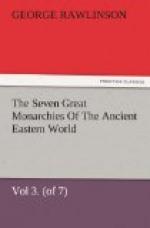A minor charge preferred against the Magian morality by Xanthus, or rather by the pseudo-Xanthus, has possibly a more solid foundation. “The Magi,” this writer said, “hold their wives in common: at least they often marry the wives of others with the free consent of their husbands.” This is really to say that among the Magians divorce was over-facile; that wives were often put away, merely with a view to their forming a fresh marriage, by husbands who understood and approved of the transaction. Judging by the existing practice of the Persians, we must admit that such laxity is in accordance with Iranic notions on the subject of marriage—notions far less strict than those which have commonly prevailed among civilized nations. There is, however, no other evidence, besides this, that divorce was very common where the Magian system prevailed; and the mere assertion of the writer who personated Xanthus Lydus will scarcely justify us in affixing even this stigma on the religion.
Upon the whole, Magism, though less elevated and less pure than the old Zoroastrian creed, must be pronounced to have possessed a certain loftiness and picturesqueness which suited it to become the religion of a great and splendid monarchy. The mysterious fire-altars on the mountain-tops, with their prestige of a remote antiquity—the ever-burning flame believed to have been kindled from on high—the worship in the open air under the blue canopy of heaven—the long troops of Magians in their white robes, with their strange caps, and their mystic wands—the frequent prayers—the abundant sacrifices—the long incantations—the supposed prophetic




